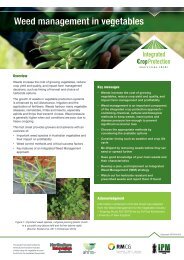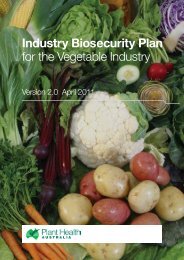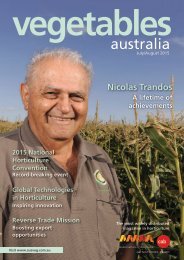vegetables
VA-NovDec2015
VA-NovDec2015
Create successful ePaper yourself
Turn your PDF publications into a flip-book with our unique Google optimized e-Paper software.
44<br />
MINOR USE<br />
AWARENESS<br />
PROGRAM<br />
Minor Use Awareness Program: Latest news<br />
GET INVOLVED IN MINOR USE! WHILE MINOR USE IS A VITAL ASPECT OF THE<br />
AUSTRALIAN VEGETABLE INDUSTRY, SOME GROWERS MAY BE CONFUSED<br />
ABOUT THE PROCESS INVOLVED IN DEVELOPING A PERMIT. AUSVEG<br />
MINOR USE AND AGRONOMY COORDINATOR SCOTT KWASNY REPORTS.<br />
The Australian agricultural<br />
chemical market represents<br />
approximately two per cent of<br />
global sales. So when chemical<br />
companies look to register a<br />
product in Australia, it has<br />
traditionally been too costly and<br />
time-consuming to produce<br />
the data required for minor<br />
commodities. Due to the cost<br />
of trials, there is often a lower<br />
return on investment available to<br />
cover minor crops.<br />
This has resulted in many<br />
older chemical control options<br />
only having a limited list of<br />
approved commodities for onlabel<br />
treatments.<br />
National Permit System<br />
The Australian Pesticides and<br />
Veterinary Medicines Authority<br />
(APVMA) has developed a<br />
National Permit System, which<br />
adds flexibility to chemical<br />
access.<br />
A minor use permit legalises<br />
an off-label use for a specific<br />
purpose. These permits still<br />
have to comply with APVMA<br />
requirements for safety and<br />
efficacy.<br />
Behind the permit<br />
Minor use has played an integral<br />
role in developing around two<br />
thirds of Australia’s current<br />
Maximum Residue Limits, which<br />
shows how important minor<br />
use is and continues to be for<br />
agricultural industries.<br />
Most minor use permit<br />
applications are initially<br />
assessed based on the data at<br />
hand. However, a number of<br />
permits do require additional<br />
data to complete the application,<br />
including existing international<br />
data and/or residue analysis<br />
data produced within Australia<br />
under good laboratory practice.<br />
Requesting a permit<br />
To request a minor use permit,<br />
there must be a gap identified<br />
where there are limited alternate<br />
modes-of-action options through<br />
currently approved chemistry<br />
available to treat a pest issue.<br />
Some key considerations<br />
when requesting a permit are:<br />
• Emergence of resistance in<br />
the pest.<br />
• Additional mode-of-action<br />
to allow for rotation to avoid<br />
emergence of resistance.<br />
• Integrated Crop Protection<br />
compatibility.<br />
• Unsuitability of current<br />
chemistry for trade or market<br />
access.<br />
Minor Use Database<br />
Minor use plays an integral<br />
role in the Australian vegetable<br />
industry, and it is imperative<br />
that growers and stakeholders<br />
register their details on the<br />
Minor Use Database.<br />
All minor use and emergency<br />
use permit costs for the<br />
vegetable industry are funded<br />
through the National Vegetable<br />
Levy. This means that it is<br />
imperative for vegetable growers<br />
to have a voice in this area,<br />
which can be achieved through<br />
the database.<br />
It’s important to remember<br />
that the Minor Use Database<br />
isn’t just about minor use.<br />
Information can also be<br />
used to assist in providing<br />
improved chemical access for<br />
vegetable growers. The more<br />
farms involved, the better the<br />
information and the more action<br />
that can be taken.<br />
For these reasons and more,<br />
it is vital to have as many<br />
growers representing as many<br />
different vegetable commodities<br />
as possible on the database.<br />
Joining the Minor Use Database<br />
is your opportunity to play an<br />
integral role in improving access<br />
to agrichemicals in Australia.<br />
i<br />
To request any of the minor<br />
use forms, please contact<br />
AUSVEG Minor Use and<br />
Agronomy Coordinator Scott<br />
Kwasny on (03) 9882 0277,<br />
or email minoruse@ausveg.<br />
com.au.<br />
For more information about<br />
minor use, visit<br />
www.ausveg.com.au/<br />
minoruse.<br />
Project Number: VG13096





